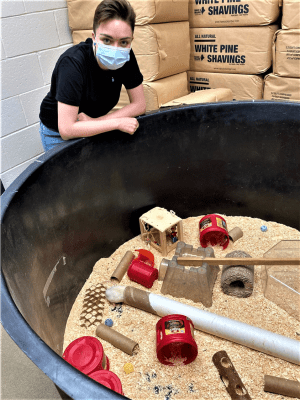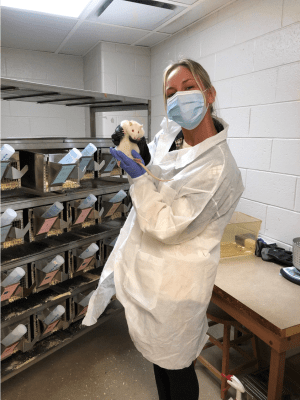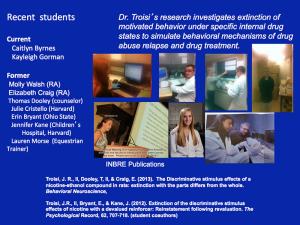
Education
1990-1992 - Post-Doctoral Fellow Behavioral Pharmacology, Johns Hopkins University School of Medicine
1990 - Ph.D., Experimental Psychology, Temple University
1984 - B.A., Psychology, Temple University
Professor Troisi’s behavioral neuroscience research utilizes drug discrimination training in rats to investigate extinction of motivated voluntary behavior (and the interaction with involuntary behavior) under common drugs and drugs of abuse. The goal is to model how other internal states (stress, hunger, thirst, emotions, craving and other drug effects) play roles in relapse behavior and its inhibition (i.e., treatment). His work investigates conditioning with nicotine (and alcohol), and how environmental stimuli influence internal stimulus effects during extinction and relapse-like phenomena. This translational research has implications for drug abuse and drug abuse treatment. Professor Troisi received a second NIH (NH-INBRE) grant to study sex differences in drug discrimination with nicotine.
Prior to arriving at Saint Anselm College, Professor Troisi was a Post-Doctoral research fellow in human behavioral pharmacology/substance abuse at Johns Hopkins University School of Medicine’s Behavioral Pharmacology Research Unit (BPRU). At Hopkins, he worked with recreational drug abusers to investigate human drug discrimination and drug abuse-liability- assessment of novel sedative/hypnotic drugs. Professor Troisi taught previously as an instructor during graduate school at Temple University. His research then focused on endogenous opioid mediation and Pavlovian conditioning factors of stress induced analgesia in Learned Helplessness (a model of human depression). His general research interests are rooted in, experimental analysis of behavior, associative learning and Pavlovian/operant interaction.
Professor Troisi has collaborated with colleagues at Kings College London England, Exeter University UK, University of Kentucky, Northeastern University Center for Drug Discovery, and also established connections for potential projects with colleagues at TUFTS University Veterinary School. He serves as an expertise reviewer for several peer journals in animal learning and behavioral pharmacology. Professor Troisi states, “Research and teaching are symbiotically interrelated”
Saint Anselm College
- Professor, 2004 - Present
- Associate Professor, 1996 - 2004
- Assistant Professor, 1992 - 1996
University of New Hampshire, Manchester
- Adjunct Professor
Temple University
- Instructor, Department of Psychology
- Teaching Assistant, Department of Psychology
- NIH INBRE (Dartmouth College) NH grant ($177,000) June, 2020-2022
- NIH INBRE (Dartmouth College) NH grant ($85,000.00) 2010-2013
- Saint Anselm College Faculty Research Grants (Summer 1998, 2002, 2006)
- National Institute on Drug Abuse, Travel Award (August, 1999).
- National Institute on Drug Abuse, Postdoctoral Fellowship (July, 1990- July, 1992)
- Perini Project Grant for infrastructure (rejected, 1993/1994).
- Committee on Problems on Drug Dependence Travel Award (June, 1990)
- Temple University Dissertation Support Grant (1989)
- Temple University Biomedical Summer Research Grants (1985, 1986)
- Temple University Graduate School Tuition Scholarship (1984-1990)
- American Association for the Advancement of Science (AAAS)
- Association for Behavior Analysis (ABA)
- Behavioral Pharmacology Society (BPS)
- The Pavlovian Society
- Eastern Psychological Association (EPA)
- Society for the Stimulus Properties of Drugs (President 2012-2013).
Expert Reviewer Requests
- Alcoholism: Clinical and Experimental Research
- Animal Learning & Behavior
- Experimental & Clinical Psychopharmacology
- Behavioral & Brain Research
- Psychopharmacology
- Behavioural Pharmacology
- Psychological Record
- Behavioural Processes
- Conference Presentations Reviews
- Society for Research on Nicotine and Tobacco (Spring 2005, Fall 2006)
- New England Psychological Association (1998)
Troisi, J. R., II (2019). Ethanol nicotine & nicotine ethanol drug sequence discriminations: Conditional stimulus control with two interoceptive drug elements in rats. Alcohol, 77, 125-134. doi.org/10.1016/j.alcohol.2018.10.012
Troisi, J. R., II, & Michaud, N. L. (2019). Can the discriminative stimulus effects of nicotine function concurrently as modulatory opponents in operant and Pavlovian occasion setting paradigms in rats? Behavioural Processes, 158, 144-150.
Troisi, J. R., II (2018). The discriminative stimulus effects of nicotine & ethanol with two distinct olfactory contexts in male and female rats. Behavioural Processes, 157, 111-114.
Troisi, J. R., II, & Mauro, B. C. (2017). Do pavlovian processes really mediate behavioral momentum? Some conflicting issues. The Psychological Record, doi:10.1007/s40732- 017-0259-7
Hogarth, L. Zhimin, H., Chase, H. W., Willis, A. J., Troisi, II, J. R., Leventhal, A. M., Amanda, M. R., & Hitsman, B. (2015). Negative mood reverses devaluation of goal-directed drugseeking favouring an incentive learning account of drug dependence. Psychopharmacology, 232, 3235-3247. 10.1007/s00213-015-3977-z
Troisi, J. R., II, & Craig, E. M. (2015). Configurations of the interoceptive discriminative stimulus effects of ethanol and nicotine with two different exteroceptive contexts in rats: Extinction & recovery. Behavioural Processes, 115, 169-180 doi:10.1016/j.beproc.2015.04.007
Hogarth, L., & Troisi, J. R., II (2015). A hierarchical instrumental decision theory of nicotine dependence. In D. Balfour & M. R. Munafò (Eds.), The Neurobiology and Genetics of Nicotine and Tobacco (pp. 165-191). Springer International Publishing.
Troisi, J. R., II (2015). Sensation within the Skin. ACS Chemical Neuroscience, 6(2) 209-210 DOI: 10.1021/cn500300a http://pubs.acs.org/doi/abs/10.1021/cn500300a
Hogarth, L., Retzler, C., Munafò, M. R., Tran, D. M. D., Troisi, J. R. II, Rose, A. K., Jones, A., & Field, M. (2014). Extinction of cue-evoked drug-seeking relies on degrading hierarchical instrumental expectancies. Behavioural Research and Therapy, DOI: 10.1016/j.brat.2014.06.001
Troisi, J. R., II (2014). It’s timely and time for the change: Comments on Peck & Ranaldi. Psychopharmacology, 231: 2371–2373 DOI: 10.1007/s00213-014-3604-4
Troisi, J. R., II, Dooley, T, II, & Craig, E. (2013). The Discriminative stimulus effects of a nicotineethanol compound in rats: extinction with the parts differs from the whole. Behavioral Neuroscience, 127, 899-912.
Troisi, J. R., II (2013). Perhaps More Consideration of Pavlovian-Operant Interaction May Improve the Clinical Efficacy of Behaviorally Based Drug Treatment Programs. The Psychological Record, 63(4), 863-893.
Troisi, J. R., II (2013). The Pavlovian vs. operant interoceptive stimulus effects of EtOH: Commentary on Besheer, Fisher, & Durant (2012). Alcohol, 47(6):433-436. doi: 10.1016/j.alcohol.2013.06.002. Epub 2013 Jul 18.
Troisi, J. R., II (2013). Acquisition, extinction, recovery, and reversal of different response sequences under conditional control by nicotine in rats. The Journal of General Psychology, 140(3), 187-203.
Troisi, J.R., II, Bryant, E., & Kane, J. (2012). Extinction of the discriminative stimulus effects of nicotine with a devalued reinforcer: Reinstatement following revaluation. The Psychological Record, 62, 707-718. (student coauthors)
Troisi, J. R., II (2011). Pavlovian extinction of the discriminative stimulus effects of nicotine and ethanol in rats. The Psychological Record, 61, 199-212.
Troisi, J. R., II, Le May, B., & Jarbe, T. U. C. (2010). Transfer of the discriminative stimulus effects of 9-THC and nicotine from one operant to another in rats. Psychopharmacology, 212, 171-179.
Troisi, J. R., II (2006). Pavlovian-instrumental transfer of the discriminative stimulus effects of nicotine and ethanol in rats. The Psychological Record, 56, 499-512.
Troisi, J.R., II & Akins, C. (2004). The discriminative stimulus effects of cocaine in a sexual reinforcement paradigm using male Japanese quail. Experimental & Clinical Psychopharmacology, 12, 237-242.
Troisi, J.R., II (2003). Spontaneous recovery during, but not following, extinction of the discriminative stimulus effects of nicotine in rats: Reinstatement of stimulus control. The Psychological Record, 53, 579-592.
Troisi, J.R., II (2003). Nicotine vs. ethanol discrimination: Extinction and spontaneous recovery of responding. Integrative Physiological & Behavioral Sciences, 38, 104-123.
Rush, C.R., Critchfield, T.S., Troisi, J.R., II & Griffiths, R.R. (1995). Discriminative stimulus effects of diazepam and buspirone in normal volunteers. Journal of the Experimental Analysis of Behavior, 65, 277-294.
Evans, S.M., Troisi, J.R., II, & Griffiths, R.R. (1994). Tandospirone and alprazolam: Comparison of behavioral effects and abuse liability in humans. Journal of Pharmacology and Experimental Therapeutics, 271, 683-694.
Troisi, J.R., II, Critchfield, T.S., & Griffiths, R.R. (1993). Buspirone and lorazepam abuse liability in humans: behavioral effects, subjective effects and choice. Behavioural Pharmacology, 4, 217-230.
Griffiths, R.R., Troisi, J.R., II, Silverman, K., & Mumford, G. (1993). Multiple choice procedure: An efficient approach for investigating drug reinforcement in humans. Behavioral Pharmacology, 4, 3-13.
Troisi, J.R., II, Evans, S.M, & Griffiths, R.R. (1993). Human studies of relative abuse liability of benzodiazepines and novel sedative/anxiolytics. Clinical Neuropharmacology, 15, (suppl.1, Pt. A, 108A-109A).
Blustein, J.E., Whitehouse, W.G., Calcagnetti, D., Troisi, J.R., II, Margules, D., & Bersh, P.J. (1992). Reduction of learned helplessness by central administration of quaternary naltrexone. Physiology and Behavior, 51, 1075-1078.
Troisi, J.R., II, Bersh, P.J., Stromberg, M.F., Mauro, B.C., & Whitehouse, W.G. (1991). Stimulus control of immunization against chronic learned helplessness. Animal learning & Behavior, 19, 88-94.
Whitehouse, W.G., Bersh, P.J., Blustein, J.E., & Troisi, J.R., II (1988). Signals for shock-free periods during chronic exposure to delayed-escapable and inescapable shocks: Effects on later escape acquisition. Learning & Motivation, 19, 142-161.
Conference Presentations and Published Abstracts
Caldwell, A., McKenna, M., Troisi, J. (2020). Anorexia/Rats, EPA virtual
Rigby,J., McKenna, M., Troisi, J. (2020). Vaping/College Students, EPA virtual
Troisi, J. R., II, & Ashton, M. (2018). The caffeinol-nicotine gestalt: Ternary, binary, and elementary excitatory and inhibitory discriminative stimulus effects in rats. Paper presented at the Annual meeting of the Behavioral Pharmacology Society, April 21, San Diego, CA.
Troisi, J. R., II, & Cuomo, S. (2018). The discriminative stimulus effects of nicotine & ethanol in two disctinct odor contexts. Procedings and Abstracts of the 89th Annual Meeting of the Eastern Psychological Association, 88, p 39. Behavioral Neuroscience Paper presentation
Troisi, J. R., II (2017). Behavior in Behavioral Pharmacology: Emission, Elicitation and Evocation ~ are they different ? Paper presented at the Annual meeting of the Behavioral Pharmacology Society. Chicago, IL
Michaud, N., & Troisi, J. R., II (2017). Operant and pavlovian conflicting contingencies under stimulus control by nicotine. Procedings and Abstracts of the 88th Annual Meeting of the Eastern Psychological Association, 88, p 47. Poster presentation
Ashton, M. & Troisi, Troisi, J. R., II (2017). Discriminative stimulus effects of nicotine and caffeine compound compound in rats: Configural learning. Procedings and Abstracts of the 88th Annual Meeting of the Eastern Psychological Association, 88, p 47. Poster presentation
Patten, T., & Troisi, J. R., II (2017). Can social enrichment reinstate the discriminative stimulus effects of nicotine? . Procedings and Abstracts of the 88th Annual Meeting of the Eastern Psychological Association, 88, p 48. Poster presentation.
Kiley, M., & Troisi, J. R., II (2017). The effects of nicotine on schedule-induced polydipsia with and without alcohol. Procedings and Abstracts of the 88th Annual Meeting of the Eastern Psychological Association, 88, p 46. Poster presentation
Lavalle, M., & Troisi, J.R., II (2017). Conditional control among odor cues and drug states in rats. . Procedings and Abstracts of the 88th Annual Meeting of the Eastern Psychological Association, 88, p 46. Poster presentation
Goddard, B. L., Lavigne, E., Butkus, L., Fandunyan, E., & Troisi, J. R. II (2016). The discriminative stimulus effects of nicotine as a function of time of day: Influence of phase shifts from AM to PM and PM to AM. Paper presented at the annual meeting of the Behavioral Pharmacology Society, April 2nd, San Diego, CA. (Troisi delivered talk).
Troisi, J. R., II, Byrnes, C., & Gorman, K. (2015). Nicotine functions simultaneously as an operant SD and a Pavlovian feature negative stimulus, or as an S and feature positive stimulus. Paper presented at the 58th Annual Meeting of the Behavioral Pharmacology Society, Westin Boston Waterfront, March 27-28, Boston, MA.
Troisi, J. R., II (2015). Caffeinol (caffeine + EtOH): Binary and ternary configural drug discriminations in rats. Procedings and Abstracts of the 86th Annual Meeting of the Eastern Psychological Association, 86, p 125. Paper presentation.
Troisi, J. R., II & Craig, E. M. (2014). Configuration of nicotine and alcohol in two external contexts: Extinction and recovery. Procedings and Abstracts of the Annual Meeting of Eastern Psychological Association, 85, p 15. Paper.
Troisi, J. R., II & LeMay, G. (2014). The discriminative stimulus functions of nicotine-alcohol sequences in rats. Society for Research on Nicotine and Tobacco, Seattle, WA, February 6., p 135.
Troisi, J. R., II (2012). A configural conditioning approach to the discriminative stimulus effects of a nicotine-ethanol mixture in rats: The whole is different from the sum of its parts during acquisition and following extinction. Paper presented at the 34th Meeting of the Society for Stimulus Properties of Drugs, New Orleans, LA. October 14, 2012.
Troisi, J. R., II (2012). Let us reconsider the role that the Pavlovian CS plays in conditioned reinforcement. Presentation at the the annual meeting of the Pavlovian Society, Sept 20- 23, Jersey City, NJ.
Troisi, J. R. II (2012). A functional analysis of extinction of the discriminative stimulus function of nicotine. Poster presented at the annual meeting of the Association for Behavior Analysis, May 26, Seattle, WA
Troisi, J. R. II (2011). The discriminative stimulus functions of nicotine under low- and high-drive states and in the regulation of complex behavioral repertoires in rats: some implications for relapse. Paper presented at the 33rd Annual Meeting of the Society for Stimulus Properties of Drugs, American University, Washington, DC. November 11, 2011.
Troisi, J. R. II and Morse, L (2011). Behavioral resesurgence: A contextual analysis. Procedings and Abstracts of the Annual Meeting of Eastern Psychological Association, 82, p 133. Stratton, J. E., and Troisi, J. (2009). An analysis of within-group and between-group differences on alcohol consumption in rats housed in social isolation and social enrichment. Procedings and Abstracts of the Annual Meeting of Eastern Psychological Association, 80, p 136.
Troisi, J. R., II (2007). Pavlovian extinction of the discriminative stimulus effects of nicotine and ethanol in rats. Procedings and Abstracts of the Annual Meeting of Eastern Psychological Association, 78, 34. Paper.
Beauchemin, K. & Troisi, J. (2007). Double expectancy effect of the discriminative stimulus effects of nicotine & ethanol in rats: Extinction under contiuous reincforcement and excitation with dual inhibition. Procedings and Abstracts of the Annual Meeting of Eastern Psychological Association, 78, 105. Poster
Troisi, J. R., II (2006). Pavlovian-Instrumental transfer of the discriminative stimulus effects of nicotine and ethanol. Procedings and Abstracts of the Annual Meeting of Eastern Psychological Association, 77, 111. Paper.
Bachelder, J., & Troisi, J. R. (2006). Transfer of contextual control to a novel operant? Procedings and Abstracts of the Annual Meeting of Eastern Psychological Association, 77, 42. Poster.
Koeltzow, T., Chivilo, J., & Troisi, J. R. (2006). The discriminative stimulus effects of a caffeineethanol mixture (Caffeinol) in Rats. Procedings and Abstracts of the Annual Meeting of Eastern Psychological Association, 77, 40. Poster.
Cotterly, L. & Troisi, J. R., II (2005). Ethanol self-administration in an appetitive learned helplessness paradigm: The effects of non-contingent food and extinction. Procedings and Abstracts of the Annual Meeting of Eastern Psychological Association, 76, 41. Poster presentation.
Eldridge, K., & Troisi, J. R., II (2005). An analysis of extinction and spontaneous recovery of a time-of-day discrimination in rats. Procedings and Abstracts of the Annual Meeting of Eastern Psychological Association, 76, 41. Poster presentation.
Petrosino, J. & Troisi, J. R., II (2005). Time of day and context: A conditional discrimination. Procedings and Abstracts of the Annual Meeting of Eastern Psychological Association, 76, 41. Poster presentation.
Hurley, K. & Troisi, J. R., II (2005). Schedule-induced anorexia in female rats: Age and reinstatement. Procedings and Abstracts of the Annual Meeting of Eastern Psychological Association, 76, 41. Poster presentation.
Troisi, J. R., II (2004). A functional analysis of simultaneous and sequential compound of nicotine and EtOH in rats. Paper presented at the annual meeting of the Society for the Stimulus Properties of Drugs (Society for Neuroscience), San Diego, CA, October 25.
Troisi, J. R., II (2004). Pavlovian-like phenomena in drug discrimination research. Invited talk at the annual meeting of the Pavlovian Society, Baltimore, MD, September 17.
DiDio, A., & Troisi, J.R., II (2003). The discriminative stimulus effects of nicotine: modulation by times-of-day. Procedings and Abstracts of the Annual Meeting of Eastern Psychological Association, 74, A19. Poster presentation.
Albanese, J., Hatton, R., & Troisi, J. R, II (2003). Cross-tolerance between the ataxic effects of ethanol and nicotine in rats? Procedings and Abstracts of the Annual Meeting of Eastern Psychological Association, 74, A19. Poster presentation.
Akins, C.K., Troisi, J. R, II, & Steger, C. (2003). The discriminative stimulus effects of cocaine in Japanese quail: Evidence for occasion setting in a sexual reinforcement paradigm. Presented at the Winter Conference on Animal Learning & Behavior, Winter Park, Colorado. Paper presentation.
Downer, J. & Troisi, J.R., II (2002). Naltrexone and schedule induced anorexia in female rats: Age, acquisition, and Reinstatement. Procedings and Abstracts of the Annual Meeting of Eastern Psychological Association, 73, 18. Poster presentation
Thompson, B. M., & Troisi, J.R., II. (2001). Ethanol self-administration and the influence of nicotine under schedule-induced polydipsia. Proceedings and Abstracts of the Annual Meeting of Eastern Psychological Association, 72, 49. Poster presentation
Troisi, J. R., II (2000). Extinction of the discriminative stimulus properties of nicotine and ethanol in rats: An analysis of spontaneous recovery and context renewal. Proceedings and Abstracts of the Annual Meeting of Eastern Psychological Association, 71, 13. Paper presentation.
Grant, K., A. & Troisi, J.R., II. (2000). The discriminative stimulus properties of a nicotine/caffeine mixture in rats. Proceedings and Abstracts of the Annual Meeting of Eastern Psychological Association,. 71, 78. Poster presentation
Troisi, J. R., II, Williams, R. & McDonough, S. G., (1999). A one-lever approach to the study of the discriminative stimulus properties of nicotine in rats. Proceedings and abstracts of the Annual Meeting of the Eastern Psychological Association, 70, 92. Poster presentation
Troisi, J. R., II, & McDonough, S. G., (1999). The conditional and discriminative stimulus properties of simultaneous and sequential compounds of nicotine and ethanol in rats. Proceedings and abstracts of the Annual Meeting of the Eastern Psychological Association, 70, 92. Poster presentation
Troisi, J. R., II, & Williams, R. (1998). Can nicotine modulate the discriminative stimulus properties of an interoceptive drug stimulus? Proceedings and abstracts of the Annual Meeting of the Eastern Psychological Association, 69, 49. Poster presentation
Troisi, J. R., II, & Auger, J. (student) (1997, April). The conditional discriminative stimulus effects of nicotine: modulation of an exteroceptive discriminative stimulus in rats. Poster presented at the Annual Meeting of the Eastern Psychological Association, Washington, DC. Poster presentation
Finn, P. E., Troisi, J. R., & Schuschu, K (student) (1997, January). Statistics (Self Report and GSR Measures): A teaching tool for behavioral statistics. Poster presented at the Nineteenth Annual Conference of the National Institute on the Teaching of Psychology, St. Petersburg Beach, Florida. Poster presentation
Bell, J.M (student) & Troisi, J.R. (1996, March). Nicotine promotes weight loss in rats housed in activity wheels and maintained on a restricted feeding schedule. Poster presented at the Annual Meeting of the Eastern Psychological Association, Philadelphia, Pa. Poster presentation
Troisi, J.R., II, & Ward, S. (1995, October). The effects of social and environmental stimuli on smoking desirability among college students. Poster presented at the 35th Annual Meeting of the New England Psychological Association, Gordon College, Wenham, MA. Poster presentation
Mohan, C.M., (student) & Troisi, J.R., II (1995, March). Caffeine increases directed motor activity in rats maintained on chronic caffeine, in Whyman running wheels. Poster presented at the Psi Chi Poster Session at the Annual Meeting of the Eastern Psychological Association, Boston, MA Poster presentation.
==========================================================================
Rush C.R., Troisi, II, J.R., Critchfield, T.S., Texter J.H., Griffiths, R.R. (1994). Discriminability of subtherapeutic doses of diazepam and buspirone in humans. In: Harris LS (ed) Problems of Drug Dependence 1993. NIDA Research Monograph 141. U.S. Department of Health and Human Services, Rockville, Maryland, pp 23
Troisi, J.R., II (1993, October). Discriminability of Subtherapeutic doses of diazepam and buspirone in Humans. Paper presented at the Annual Meeting of the New England Psychological Association, St. Anselm College, Manchester , NH. Poster presentation.
Troisi, J.R., II, Silverman, K., & Griffiths, R.R. (1991, June). Multiple choice (Drug vs. Money): An efficient approach for assessing the reinforcing effects of drugs. Poster presented at the 54th Annual Scientific Meeting of the College on Problems of Drug Dependence, Keystone, Colorado. Poster presentation
Troisi, J.R., II, Critchfield, T.S., Griffiths, R.R. (1991, August). The reinforcing and subjective effects of buspirone and lorazepam. Poster presented at the Annual Meeting of the American Psychological Association, San Francisco, California. Poster presentation
Troisi, J.R., II, Critchfield, T.S., & Griffiths, R.R. (1991, June). Diazepam discriminations in humans: A within-subject analysis. Poster presented at the 53rd Annual Scientific Meeting of the Committee on Problems of Drug Dependence, Palm Beach, Florida. Poster presentation
Bersh, P.J., Troisi, J.R., II, Whitehouse, W.G., Stromberg, M.F., & Mauro, B.C. (1991, April). Shock escape impairment as a function of chronicity of prior signalled-shock exposures. Abstracts of the Annual Meeting of the Eastern Psychological Association, 62, 23. Poster presentation.
Troisi, J.R., II, & Bersh, P.J. (1990, November). Is the target in a facilitation paradigm a conditioned inhibitor? Bulletin of the Psychonomic Society. 31, 49. Paper presented at the Annual Meeting of the Psychonomic Society, New Orleans, Louisiana. Paper presentation.
Bersh, P.J., Troisi, J.R., II, Stromberg, M.F., Mauro, B.C. & Whitehouse, W.G. (1989, June). Immunization against chronic learned helplessness. Paper presented at the Annual Meeting of the American Psychological Society, Arlington, VA. Poster presentation
Bersh, P.J., Troisi, J.R., II, Stromberg, M.F., & Whitehouse, W.G. (1989, March). Chronic learned helplessness in the rat: Therapy by Pavlovian extinction and vacation. Proceedings and Abstracts of the Eastern Psychological Association, 60, 48. Poster presentation
Blustein, J.E., Bersh, P.J., Troisi, J.R., II, & Whitehouse, W.G. (1989, March). Effect of naltrexone and MR2266 on short-term analgesia. Proceedings and Abstracts of the Annual Meeting of the Eastern Psychological Association, 60, 48. Poster presentation
Whitehouse, W.G., Bersh, P.J., Blustein, J.E., Troisi, J.R., II, & Stromberg, M.F. (1988, November). A failure to immunize against chronic learned helplessness. Paper presented at the annual meeting of the Psychonomic Society. Paper presentation
Blustein, J.E., Bersh, P.J., Troisi, J.R., II, & Whitehouse, W.G., (1988, April). Effects of naltrexone and MR2266 on shock-escape after inescapable shock exposure. Proceedings and Abstracts of the Annual Meeting of the Eastern psychological Association, 59, 40. Poster presentation
Troisi, J.R., II, Blustein, J.E., Walker, J., Bersh, P.J., & Whitehouse, W.G. (1987, April). Induction of analgesia and shock escape impairment by the opioid kappa agonist U-50,488. Proceedings and Abstracts of the Annual Meeting of the Eastern psychological Association, 58, 40. Poster presentation
Bersh, P.J., Sabulsky, S.L., Troisi, J.R., II, & Blustein, J.E., (1986, November). Stimulus control based on shock escapability. Annual Psychonomic Society meeting in New Orleans, Louisiana. Paper presentation
Blustein, J.E., Bersh, P.J., Troisi, J.R., II, Margules, D., & Whitehouse, W.G. (1986, May). Facilitation of shock-escape by kappa receptor blockade despite nociceptive consequences of preshock. In B.C. Klien and D. Savold (compilers) 1986. AAAS Annual Meeting Abstracts (pp. 133-134). Washington, D.C.: AAAS. Poster presentation
Blustein, J.E., Whitehouse, W.G., Calcagnetti, D., Troisi, J.R., II, Bersh, P.J., & Margules, D. (1986, April). Reduction of learned helplessness by central administration of quaternary 11 naltrexone. Proceedings and Abstracts of the Eastern Psychological Association, 57, 28 Poster presentation
Bersh, P.J., Whitehouse, W.G., Blustein, J.E., & Troisi, J.R., II (1985, November). Delayed vs. trace conditioning in the chronic learned helplessness effect. Bulletin of the Psychonomic Society, 23, 279. Poster presentation
Whitehouse, W.G., Troisi, J.R., II, & Maliniak, A. (1985, March). Acquisition of an appetitive operant following inescapable shock: Relation to opioid stress analgesia. Proceedings and Abstracts of the Annual Meeting of the Eastern psychological Association, 56, 18. Poster presentation
Lectures & Invited Talks
Just how important, realy, are CS-US relations in operant behavior? Some data from behavioral pharmacology. Talk presented at the University of Vermont BioBehavioral research colloquium. Invitation from Mark Bouton, October 21, 2013
When We Speak of the Discriminative Stimulus Functions of Drug States: A Dissection of the Three-term Operant Contingency. Society for the Stimulus Properties of Drugs. Invited talk at the Society for Neuroscience, October 19, 2009, Chicago, IL.
Pavlovian-like phenomena in drug discrimination: Recent research. Invited talk at TUFTS University, Department of Psychology, April 13, 2005.
Pavlovian-like phenomena in drug discrimination research. Invited talk at the annual meeting of the Pavlovian Society, Baltimore, MD, September 17, 2004.
Pavlovian and Operant Influences on Drug Addiction (1993- present). Lectures presented in Dr. J. Pittochelli's Introductory Biology Class. St. Anselm College, Manchester, NH.
Drug Discrimination & Sexual Conditioning in Quail: A proposal. (July, 2002). Lecture presented to Dr. Michael Domjan's graduate lab. Department of Psycology, University of Texas at Austin.
Pavlovian Factors in Drug Discrimination (November, 2000). Lecture presented to the Experimental Psychology & Neuroscience Division. Temple University, Philadelphia, PA.
Pavlovian Factors in Drug Discrimination (Novemeber, 2000). Lecture presented to the Behavioral Pharmacology Lab (Michael Stromberg). University of Pennsylvania, VA Medical Hospital. Philadelphia, PA
Interdisciplinary Seminar on Addiction (1994, April): Other participants included Daniel Lavoie(biology) Peter Cordella (Criminal Justice), Father Augustine Kelly, Linda Barnes (counseling), James McGee (Theology).
Addiction and Choice (1994, April). Lecture presented to the Delta Epsilon Sigma Honors' Society, St. Anselm College, Manchester, NH.
Learned Helplessness and the Role of Endogenous Opiates. (1991, April). The Johns University School of Medicine, Behavioral Pharmacology Research Unit.
The Role of the Target Stimulus in the Pavlovian Facilitation Paradigm (1990, January). University of Pennsylvania Department of Psychology, Robert Rescorla Ph.D., Host.
Chaired Symposia
Chaired Physiological Psychology Paper Session at the New England Psychological Association, October, 1996.
Troisi, J.R., II, Chair, (1993, October). Current trends in human behavioral pharmacology. Symposium chaired at the New England Psychological Association, Manchester, NH.
William Morse, Ph.D., Discussant, The New England Regional Primate Research Center
General Psychology I-II
Introduces the student to the science of human and animal behavior. The scientific basis of psychology is examined. Basic topics covered are biological and cognitive foundations of behavior, individual differences, measurement techniques, personality theories and development, motivation and emotion, normal vs. abnormal behavior, perception, and learning. Prerequisite: Psychology 9 or Psychology 10.
Experimental Psychology: Research Methods and Design I-II
Methods of designing and conducting behavioral experiments. Psychological methods, data collection procedures and analysis are presented in laboratory exercises. The second semester is devoted to laboratory projects in which close cooperation between students and faculty results in completing individual studies.
History and Systems of Psychology
The historical roots of the development of modern psychology are entertained. Major areas include the behavioral and cognitive revolutions. Additionally psychoanalysis and reactions from the developing field are considered. Current topics and their roots include neuroscience, perception and intelligence. Prerequisite: Psychology 9-10 or permission of the instructor.
Learning and Motivation
Major topics include classical and operant conditioning and their applications. Associative, cognitive and vicarious learning are also considered. Additional topics include motivation, drives and incentives. Major theorists and their contributions to learning are discussed. Prerequisite: Psychology 9-10 or permission of the instructor.
Psychology of Addiction and Dependency
The psychological aspects of addiction and dependency are surveyed. The concept of addiction is entertained as related to the physical and psychological aspects of addictive behaviors. Substances that modify human behavior and emotions are studied as they relate to psychopathology and the functioning of the healthy individual. Psychological diagnosis and treatment of addiction and dependency are stressed.
Behavioral Pharmacology
Behavioral Pharmacology
- About Experimental and Clinical Psychopharmacology
- Boston 99
- Buprenorphine Bibliography
- College on Problems of Drug Dependence
- DMOZ- Open Directory Project
- Food and Drug Administration Home Page
- Homepage of Dr. Ruth Engs- Student Alcohol Questionnaire, publications, etc.
- Institute of Psychiatry Home Page
- National Institute on Drug Abuse
- Pharmacology Biochemistry and Behavior
- Psychopharmacology Tips
- SSPD - Society for Stimulus properties of Drugs
- The Drug Discrimination Bibliography
Lit Search Links
IDEAL- International Digital Electronic Access Library
Online Journals
- About Behavioral Neuroscience
- About Experimental and Clinical Psychopharmacology
- About Journal of Experimental Psychology- Animal Behavior Processes
- Animal Learning and Behavior
- APA Journals
- BBS Index
- Behavioural Brain Research
- British Journal of Pharmacology
- Drug and Alcohol Dependence
- Health Psychology, Past Tables of Contents
- Journal of the Experimental Analysis of Behavior
- JPET Online
- Learning and Motivation
- Lippincott Williams & Wilkins - Behavioural Pharmacology
- Nature
- Pharmacology Biochemistry and Behavior
- Physiology & Behavior
- Psychobiology Journal Listing
- Psychonomic Society Publications
- Psychosomatic Medicine
- Springer LINK Psychopharmacology
- Table of contents for Journal Neurobiology of Learning and Memory
Welcome to the Operant and Behavioral Pharmacology Research Lab
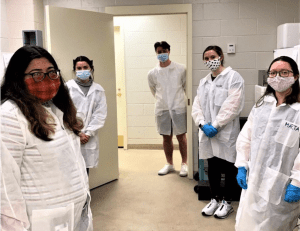
This is a multipurpose teaching/research lab designed for student and faculty research collaboration in the area of psychobiology. The research conducted here involves basic learning studies in classical (Pavlovian) & operant (Skinnerian) conditioning. These principles are applied to the study of pharmacology and behavior - hence Behavioral Pharmacology, an interdisciplinary field which in part studies experimental models of substance abuse.
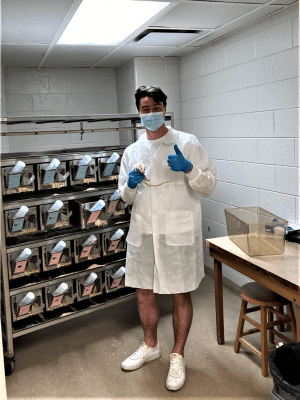
Some of the specific studies conducted here involve drug tolerance, drug discrimination, alcohol self-administration, circadian rhythm, complex contextual control of behavior and drugs, & behavioral extinction. This last area may be useful for drug rehabilitation treatment since environmental cues are correlated (predict) drug effects. We welcome ideas from students for possible research projects in collaboration with faculty.
